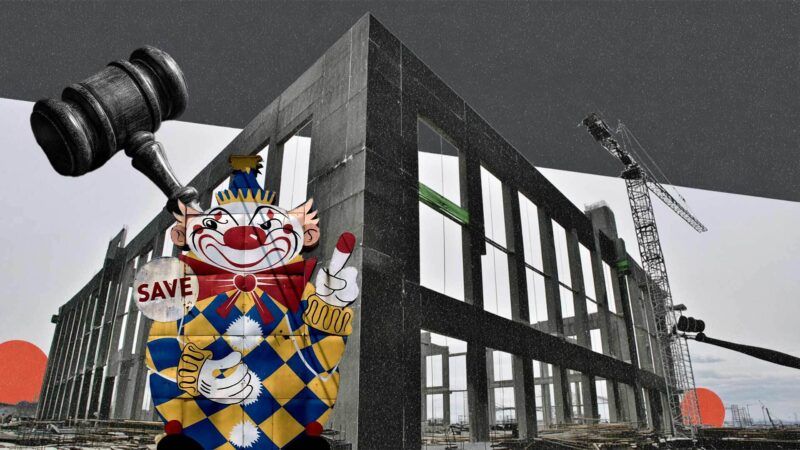New Jersey Court Strikes Down Town's Use of Eminent Domain To Skirt Affordable Housing Mandates
Despite the setback, Middletown Township is taking the case to the state supreme court.

A New Jersey town's attempt to bypass the state's affordable housing mandate has hit a roadblock. On June 27, the New Jersey Superior Court upheld a trial court ruling preventing Middletown Township from using eminent domain to seize a 52-acre property that previously housed a Circus Liquor Store and turn it into a commercial development for "recreational use." Middletown is now taking the case to the state Supreme Court.
In the summer of 2023, AAMHMT Property, LLC, purchased the property and filed a "builder's remedy" lawsuit—which would have allowed it to rezone the property for higher density building—alleging that the township violated its affordable housing obligations as required by state law, reports Patch News. Under the Mount Laurel doctrine, New Jersey municipalities are required to build their "fair share" of affordable housing and submit a plan for meeting these obligations to the Fair Share Housing Center (FSHC) for review.
Middletown withdrew from the state's affordable housing obligations, which current Mayor Tony Perry has called "unreasonable," in 2019, according to The Twin River Times. Ariela Rutbeck-Goldman, a senior staff attorney at the FSHC who argued the case before the court, tells Reason that since Middletown has opted out of the housing mandate, they are "not immune from these sorts of builders' remedy cases."
AAMHMT had proposed building a 937-unit residential complex on the property, including apartments, townhomes, and affordable housing units. The township said this plan conflicts with their redevelopment agreement with the previous owners, the Azzolina family, and their plans for the property. Middletown claims that only half the property is zoned for residential use and is already under construction for 400 units, 80 of which are affordable. The other half is restricted to commercial or public use.
After the lawsuit was filed, the Township Committee voted to condemn the property and designate it as an "area in need of redevelopment," which would allow them to acquire the property via eminent domain for fair market value if it meets the condemnation criteria.
Responding to this action, AAMHMT filed for and was granted an Order to Show Cause in July 2024, preventing Middletown from proceeding with the condemnation of the property or seizure through eminent domain.
In its 2024 ruling, the trial court found that AAMHMT met the requirements for a builder's remedy lawsuit. In failing to meet the obligations set by the state's third round calculations, the court stated that Middletown was "not constitutionally compliant," and had "an obligation to provide the opportunity for development of affordable housing." The trial court also ruled—and the Superior Court affirmed—that Middletown had a deficit of at least 602 affordable housing units, according to state law. AAMHMT claims the town's shortfall is 1,026 units, per the Asbury Park Press.
Middletown has a history of using eminent domain to prevent the construction of affordable housing. In 2023, Adoni Property Group filed a builder's remedy lawsuit against the town for blocking a 474-unit luxury development, which included 71 affordable housing units. In that case, Middletown officials claimed the "seventy-one units of affordable units in a sea of luxury apartments" would not be a substantial contribution to Middletown's affordable housing inventory, reports the Asbury Park Press.
Perry told the Asbury Park Press that Middletown will continue with the lawsuit against AAMHMT and take the case to the state Supreme Court to "uphold the rights of municipalities that is enshrined in the Constitution, unlike the Mount Laurel doctrine, which was created by activist judges."
New Jersey municipalities had until June 30 to submit a plan in compliance with the state's fourth-round housing obligations. According to those calculations, Middletown Township has a fourth-round obligation to build 346 units of affordable housing between 2025 and 2035, in addition to the shortfall it faces of 602 to 1,026 units from round three. Middletown has shown no indication of being willing to negotiate on their third- or fourth-round obligations, says Rutbeck-Goldman.
Housing mandates distort real estate markets and increase the government's role in the housing sector. Despite their fundamental flaws, invoking eminent domain to circumvent these obligations is also harmful and violates private property rights and the intent of the power under the Fifth Amendment. Until the government removes itself from New Jersey's real estate market, cases like the one in Middletown will likely continue.


Show Comments (15)